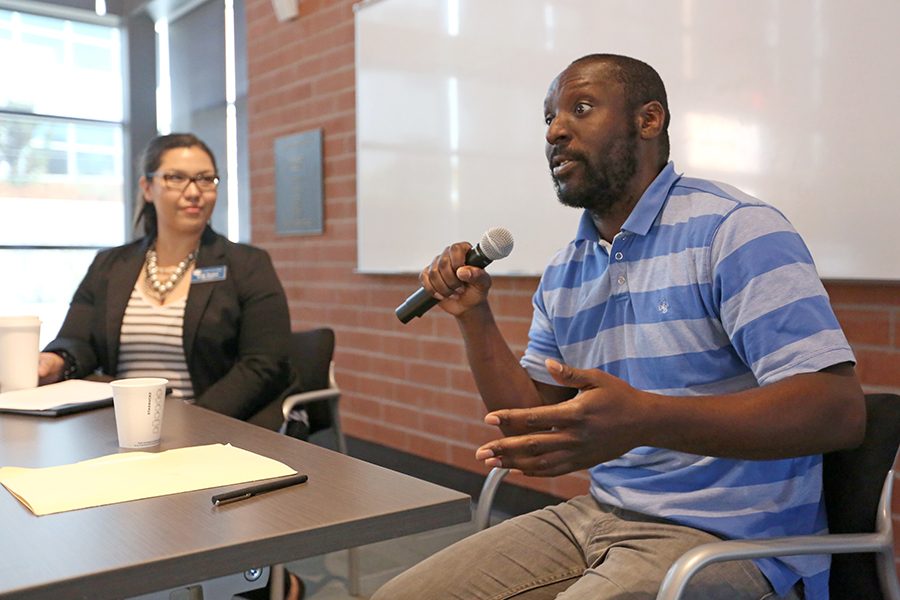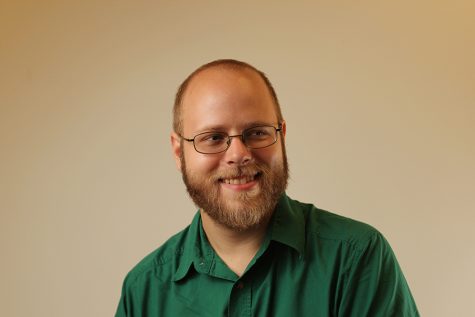Biologist stresses support
Inspiring stories of STEM success headline lecture series
Molecular and cell biologist Malik Francis speaks to students during the second installment of the Adelante STEM Academy’s STEM Café series.
Oct 6, 2016
Molecular and cell biologist Malik Francis said the path to educational success is social support and confidence in the face of obstacles, on Sept. 28 at the second of the Adelante STEM Academy’s STEM Cafés this semester.
The Cafés bring professionals in STEM fields in to talk with students at Contra Costa College. This one, in the Fireside Hall at 1 p.m., featured Dr. Francis, a research scientist at UC Berkeley.
Minority Student Retention Specialist Kelly Ramos, the HSI (Hispanic Serving Institute) STEM program’s coordinator introduced Francis and guided the discussion, but opened the floor to audience questions as well.
She said, “(the Café is an opportunity) to get to know (professionals) their career and life journey.”
Emiliano Ruiz, who is interested in a molecular biology major said, “The school provided a really good opportunity to have a connection with a professional. That’s the closest I’ve ever gotten to someone who works in (that field).”
Francis said he is a postgraduate researcher at UC Berkeley, which is a position doing additional research after finishing his Ph.D. He said he wants to be a professor eventually, though “that’s a long way down the road,” and postgraduate work helps with that goal.
Francis said he was born in Los Angeles and lived there until age 9 with his mother and four older brothers after his parent’s divorce.
He said he attended public schools until eighth grade and then went to an all boys Catholic school, Jesuit High School in Carmichael, California, though he isn’t Catholic.
“I’d wanted to be a physician since age 6, and my mom steered me toward programs that would further that,” he said.
He said that as a high school junior he started volunteering at hospital and did other afterschool programs.
His parents attended Cal State-Los Angeles, where his mother finished a sociology major — “she was terrible at science” — and his father didn’t quite finish a math major, in spite of accumulating many credits toward it.
He rejected his mother’s suggestion of Ivy League schools. “I knew pretty early on I didn’t want to leave California,” he said.
He said he initially attended UCLA, studying physiology and Spanish, majoring in Spanish Literature, but his intellectual pursuits then changed.
He moved away from both physiology and Spanish to biology, and eventually moved his studies to UC Berkeley.
He said, “The idea of sitting down with patients who won’t take their blood pressure meds seemed really infuriating to me.”
On his Spanish studies he said, “I wish I’d finished my major instead of just the minor.
“I started working in research labs in my fourth year. It’s fun because you get to ask questions and work with your hands,” he said. “I wasn’t the most dedicated student. The classes that really challenged me — I didn’t really want them. My GPA was below average.”
He said he advanced to graduate school in spite of his GPA because of his research work and “amazing letters of recommendation.” He said that it is important to get to visit your professor during their office hours, and get to know them personally.
“The biggest thing is being confident enough to advocate for yourself, and (deal with) people saying ‘no’,” he said.
“There were days in grad school where I’d work 16, 18 hours. At some point you have to be disciplined and just do it. Put on music that keeps you focused.”
Francis said, “I’m of the mind that when you think about that big picture it gets really daunting. When you have a big goal it’s important to have small goals, so when you finish them you get those endorphins.”
He said a university student needs mentors, friends, and a support group — people who have been through what you’re going through. “I didn’t get my Ph.D. on my own — that’s impossible,” he said.
“It’s OK to have moments of doubt. There are always obstacles (but) at some point you have to trust in yourself, and believe in yourself,” he said.
Francis said, “I didn’t learn as much from my professor, (as I) learned from senior post-docs, showing me techniques and (how to use equipment).
“If you know smart people, study with them. Don’t go to study session unprepared. Have a study group you take seriously.” He said after he graduated he stayed in his Ph.D. lab because there was research he had started that he wanted to finish and publish.
Francis said, “My day-to-day (routine) changes. I live in San Francisco, and taking BART every day sucks for a variety of BART-related reasons.
“I have a flexible schedule, and I’m really not a morning person. I (usually) get in around 10 or 11.
He said that while he works with some nasty chemicals, he is free to dress casually, as long as he takes sensible precautions like not wearing sandals.
He said he has seen some people being disturbingly careless with phenol. “That’s the stuff that denatures protein,” he said. Humans are largely made of protein, and getting phenol on them results in the gruesome loss of that protein.
He said once during a routine radiation survey the wall behind the fume hood turned up hot.
“The poor woman doing the survey. (As she got closer the radiation) meter kept getting louder.”
He said he remembered thinking, “It’s like Three Mile Island in here.” He said that luckily his group doesn’t work with anything too bad in terms of radiation.
He said he likes asking questions and playing with his hands and he gets a thrill when a risky experiment works.
“Don’t feel pigeon-holed into doing only one thing,” he said, “People do Ph.D. for a variety of reasons. People go into law, that’s really boring, (they do) consulting.” He said he knows a microbiologist who works at a brewing company.
Francis said he currently studies protein-DNA interactions in fruit flies.
“Fruit flies are awesome because you can do everything with them. Classic genetics, bio-chemistry, cell biology, developmental biology and genomics.”
He said he is examining the fruit fly’s capacity for DNA self-repair. DNA repair is common in nature, he said, but the fruit fly’s technique is new to science.
“(In research) you never know where that next earth shattering discovery is going to come from.”



